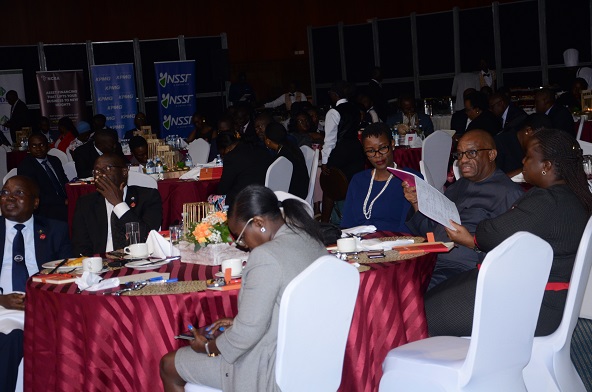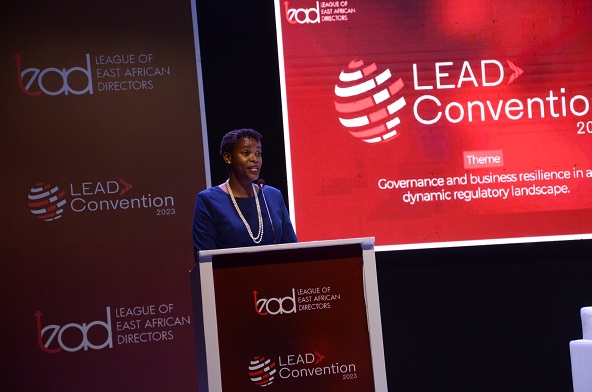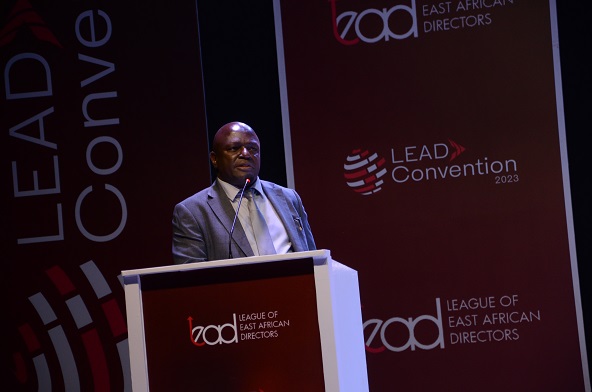
KAMPALA – League of East African Directors (LEAD), on Thursday hosted a Convention 2023 in which they discussed the challenges and opportunities that arise amidst a constantly evolving regulatory environment.
LEAD is a platform that plays a crucial role in fostering collaboration, sharing insights, and promoting knowledge exchange among directors, executives, and key decision-makers from various industries across East Africa.
Stakeholders include Executive directors and Non-Executive directors from diverse sectors, including legal, finance, governance, and compliance.
This year’s convention was held under the theme “Governance & Business Resilience in a Dynamic Regulatory Landscape”.
Ms. Gertrude Wamala Karugaba, Chairperson LEAD Board of Directors noted that the Convention was a testament to the collective commitment to transform their vision into a reality.
“In today’s rapidly changing world, characterized by a dynamic regulatory landscape, the role of directors and leaders has become more critical than ever. Our ability to adapt, evolve, and embrace these changes will determine our success as organizations and as a collective driving growth and prosperity.”
She said that throughout Convention, they would engage in insightful discussions, gain valuable insights from industry experts, and foster fruitful collaborations that will equip them to face the challenges and opportunities of tomorrow.
“Together, we will explore the best practices in governance, ensuring that transparency, accountability, and ethical conduct remain at the core of our decision-making processes,” she said.
She tasked all the members to leverage the Convention to seize every opportunity to learn, network, and forge lasting connections.

“Together, we have the power to shape a resilient and prosperous future for our organizations, our community, and our beloved nation.”
Ms. Pheona Nabasa – Wall CEO, LEAD underscored the need to come together as directors and explore innovative ways to navigate the dynamic regulatory landscape.
“Throughout this event, we have the opportunity to engage with brilliant minds, visionary speakers, and industry experts who will share their insights and experiences.”
“Their knowledge and expertise will undoubtedly enrich our understanding of effective governance and empower us to build stronger, more resilient businesses,” she added.
She encouraged the board leaders to embrace a clear vision and lead with wisdom to navigate the ever-changing regulatory challenges that lay ahead.
“Together, as a united community of directors, we can learn from one another, support each other, and thrive in this dynamic business landscape.”
“Let us embrace the challenges with determination, the changes with resilience, and the future with unwavering optimism,” she concluded.
Sam Ntulume, Chairperson Organizing Committee challenged the colleagues to steer their organizations irrespective of the changing regulatory landscape, disruptive technology, heightened risk, and the need to comply with environmental, social and governance principles.
“This convention has therefore been organized to provide you with a platform to share valuable insights and strategies for not only effectively navigating the challenges but also be able to identify and exploit the opportunities that may arise in such an environment.”
Officiating at the event, Michael Atingi-Ego, Deputy Governor of the Bank of Uganda noted that governance is a critical element of building resilience in a dynamic world and that when it comes to building organizational resilience, the regulator has a critical role to play.
Although he acknowledged that organizations operate in an environment with ever-evolving challenges, he said that some challenges originate internally, such as governance weakness, and succession or corporate failures.
He noted that some challenges are due to external factors that may be unpredictable, and in turn entirely outside the control of an organization, giving an example of the COVID-19 pandemic.

Represented by Philip Andrew Wabulya – Executive Director, Petroleum Investment Fund at BOU, he tipped that a resilient organization is one that has the right structures, and processes that can help it anticipate and prepare for, respond to, and adapt to disruptions.
“The Bank of Uganda, therefore, takes a keen interest in governance practices of the supervisory financial institutions, be it during business as usual, or periods of crisis.”
Atingi-Ego noted that people are the building blocks of an organization and can make or break an institution. He said the directors should have the capacity to navigate the challenge of working through unprecedented times against complex, volatile and uncertain economic and geopolitical backdrops.
“Organizations should have a good mix of directors in terms of demographics, experience, and professional background. Increasingly, directors must have a sound knowledge of information technology and cybersecurity.”
He tipped organizations to have sub-succession plans for their boards and senior management to avoid chances of knowledge shortage when the incumbents quit.





